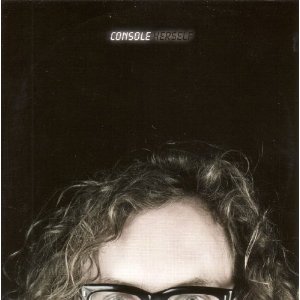Herself inhabits the same dusky twilight as Tom Waits’ Blood Money. It hides in the same bushes, climbs the same vines, rows the same rapids, peers through the same leaves. They never meet of course: One being an apocalyptic jazz sermon based on the unfinished German tragedy, Woyzeck, by Georg Büchner; the other an ambient-pop mini-opera by Martin Gretshmann of the Notwist. But these two albums still stalk the same burnt and desolate Earth. Both haunt the same plain of heartbreak. On the surface, Herself is classic vocal electronica – the kind you’d expect to hear from Fever Ray, Robyn, Portishead and, yes, the Notwist. But great as that band may be sometimes, this solo offering beats even 2001’s Neon Golden in its craft and concept.
Gretshmann’s attention to detail can be breathtaking – moments ticking by like a precision timepiece – complex, but never cluttered. This sense of finesse is matched only by an impeccable grasp over time and pacing; sombre experimental moments segueing beautifully into fully-formed dance-pop numbers. For these reasons it’s a remarkable record, not to be ignored or treated as a side-project but hailed for its technical ingenuity and care.
But for all its sublime clarity, the real draw to this record is the atmosphere it creates, and it’s uncanny how close this is to that explored in Blood Money. Even by Tom Waits’ standards, that is a devilishly complex record with a strong tonal narrative running through it. This tone was accomplished through a bed of percussion and mallet instruments, sombrely dampened for maximum foreboding. The various timbres were used to create an eerie jungle-like atmosphere, a wilderness in the mind of the play’s protagonist signifying the deterioration of his mental state.
Herself also forms a loose narrative, the track titles on the album forming whole sentences when read together. ‘She Saw’, the six-minute instrumental lead track, is borne on an ominous whorl of synths which erupt and babble like lava. This isn’t some fancy LFO effect though. The babbling comes from a rising arpeggiated marimba which comes to dominate the track in a congregation of log drums, bongos and other African instruments. These exotic sounds bear more than a passing resemblance to ‘Misery is the River of the World’, the corresponding track from Blood Money, the rattling whale-bone motif of which injects the album with a peculiar voodoo mystique.
But whereas Blood Money slopes along like an insidious hulking beast, Herself is a spectral nymph, skimming and diving around the musical lagoon both creatures inhabit. On ‘A Homeless Ghost’, singer Miriam Osterrieder plays a lonesome spectre stalking a deserted Earth in search of her lamented lover. This moody house stomper couldn’t be any more perfect really. Osterrieder’s husky overtones riding gracefully along on Gretshmann’s deft production, aural bubbles enveloping her in a whirlpool of sound.
The narrative and musical themes continue: Syncopated tribal rhythms and tuned percussion fuse with more traditional electronic sounds, while Osterrieder takes the listener a little further on her continuing journey with each track.
With a generous allotment of space, Herself is allowed to breathe and take its time over what it does. While the vocal sections are extremely effective, Console have not been afraid to keep them to a minimum, letting the music do most of the talking. Another instrumental, ‘Cutting Time’ is a spectral jungle jam while ‘Bit For Bit’ is a minimalist ballad in the XX vein. It’s not all wispiness and whimsy though. ‘Upon’ is a frantic banger of a tune with a constantly rising tempo while ‘Of Time’, with its floaty electro sound, manages to lull and intensify at the same time.
All told, Herself is nothing less than essential. Only a handful of electronic albums work on this scale of experimentation while maintaining a truly emotional and listenable core; and outside the aforementioned Waits album, very few records create an atmosphere quite like Console have done here.


